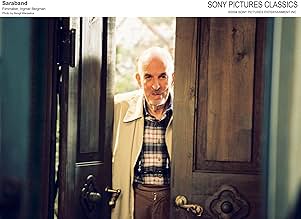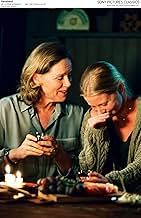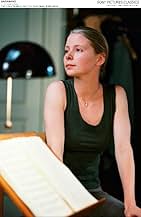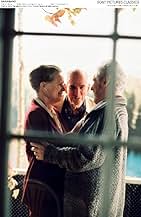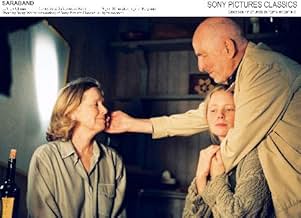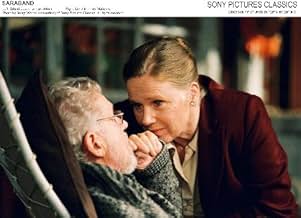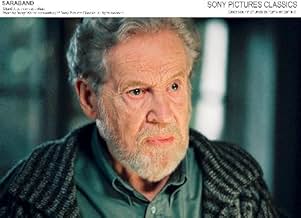अपनी भाषा में प्लॉट जोड़ेंMarianne, some thirty years after divorcing Johan, decides to visit her ex-husband at his summer home. She arrives in the middle of a family drama between Johan's son from another marriage a... सभी पढ़ेंMarianne, some thirty years after divorcing Johan, decides to visit her ex-husband at his summer home. She arrives in the middle of a family drama between Johan's son from another marriage and his granddaughter.Marianne, some thirty years after divorcing Johan, decides to visit her ex-husband at his summer home. She arrives in the middle of a family drama between Johan's son from another marriage and his granddaughter.
- पुरस्कार
- 2 जीत और कुल 3 नामांकन
कहानी
क्या आपको पता है
- ट्रिवियाThe film is very autobiographical. The character of Anna is actually Ingrid von Rosen, Ingmar Bergman's wife, who died of cancer, and was his greatest love. The photography of Anna used in the film is also of Ingrid. The movie is also dedicated "to Ingrid", as stated in the opening title screen.
- गूफ़There are some interesting discrepancies in relation to the time line of the characters. The ages given for the characters are 63 (Marianne), 86 (Johan) and 61 (Henrik). Marianne says that she has not seen Johan for 32 years and that they had been married for 16 years. This means that she married Johan when she was 15 and he was 38. Johan had a falling out with his son when Henrik was 18/19, which must have been after Johan's marriage to Marianne.
- भाव
Henrik: Dad, where does all this hostility come from?
Johan: Speak for yourself. When you were 18 or 19, I tried to get close to you. You'd been seriously ill, and your mother wanted us to talk things out. I said to you, "I know I've been a bad father, and I want to do better." And you screamed at me--yes, screamed--"A bad father? You've never been a father at all!" Then you said you could do without my forced exertions. One should respect honest hatred, and I respect yours. But I really couldn't care less if you hate me. You barely exist. If it weren't for Karin, who thank God takes after her mother, you wouldn't exist for me at all. So there's no hostility here, I assure you.
- कनेक्शनFeatured in Bergman och filmen, Bergman och teatern, Bergman och Fårö (2004)
- साउंडट्रैकCello Suite no. 5 in C Minor, Movement 4: Saraband
Composed by Johann Sebastian Bach
Performed by Torleif Thedeen (as Thorleif Thedeen)
It may be too easy to compare and contrast this film and the series. But it is of interest if only for curiosity sake. There is something of note that revealed to one how the actual cinematography can evolve properly or at least in a fashion that is not off-putting. This time around (unlike Sven Nykvist's perfect work on 'Marriage', a kind of pre-Dogma 95 style to use the camera with the story), Bergman decided to make the film for television (his on occasion work aside from theatre for the past twenty years since Fanny and Alexander) and also decided to implement digital photography. There are five cinematographers, and it's too tedious to pick out if which one did what properly or who lit this right and so on. But that in Saraband, however, doesn't suffer by way of the digital perspective. If anything, it serves its purpose fully by keeping the naturalistic mood. Some scenes are seen with as clear an eye as ever for Bergman. Others that may be a little more obscured by darkness are affecting psychologically in a way. Bergman's preference is to look at faces and expressions, without much to obscure the actors.
What is of surprise is that Bergman injects two things that he intentionally kept out of 'Scenes'- inner visions (actually shown, not just spoken and felt by the actors), and music. In at least a couple of scenes, to add an intensity and a sense of the surreal, we see what Karina sees in some key moments. She describes an ugly incident with her father. She runs through the woods. When something very ugly occurs, it happens off screen, with a pause given in-between one scream. Needless to say it was tremendously moving. The other involved an enormous, involving fantasy. She's just been told information by her grandfather Johan that is crucial for her decision towards the end. When she sits on the stairs, the camera suddenly cuts to pull back on her on a chair, against a white background, and the camera pulls back further and further at a quick pace. This kind of technique I could feel as if I've seen in maybe a dozen films. When Bergman does this, after such a hopeful scene for Karina, it is a useful technique. Whatever the intention, it's far greater a grab then in a standard action film. Those are the two kinds of scenes/images that are very emotional and immediate on a first viewing.
Ullmann and Josephson, who portrayed Marianne and Johan thirty years ago, never lose their ability to play off each other as actors. The focal point this time is with Henrik and Karina though, so the performances by Ahlstedt and especially Dufvenius for Bergman had to be even more affecting than those of the observers. Ahlstedt's Henrik is a tricky sort to empathize with perhaps: can an audience be with him when the drama unfolds with his daughter? Turns out he brings the humanity in all its darkness and seemingly complex inner-damnation as one of Bergman's most memorable characters. His conflicts with his father and daughter stem from a number of elements, but the key one is very identifiable- death of the one you've loved the most. How can change occur? This is a question posed as well for Karina, and in Ahlstedt playing her she already shows enough talent and gusto to take on stronger roles in the future. At first sight, I thought she might have been over-hitting her mark, or that Bergman was over-directing. This was not the case, and in the subtle moments she revealed herself on the level of one of Bergman's 'ladies' (i.e. Ullmann, Bibi Andersson, and Harriet Anderson).
As the closure, what does Bergman do? He does something rather wise to weave the story of the father and daughter together with the continuing story of Johan and Marianne with an equal resonance and emotional weight. The younger two find their own ends to the means, and I would not dare reveal how and why. But for Marianne Bergman answers a question that was asked if not out-right then with all of the action and tension and buildups and payoffs in 'Marriage'. Does a person know what emotion is, or what it feels like? In the final scene (to put it mildly), he and Ullmann answer it in an approach that practically had me in tears. This would not mark the first time this has happened while viewing a Bergman film, yet the fact that this is the last gave me a cleansing feeling, of the greatest cathartic release with a thoughtful film.
If it's one of the key objectives for a filmmaker in drama and tragedy to reveal it as truthfully as possible, and bring us with the character(s) full-circle, Ingmar Bergman's pulled it off wonderfully. Saraband is one of the crucial swan songs in film history (for my money, and will soon find its way to American theaters (digital projectors more or less likely). A++
- Quinoa1984
- 22 अक्तू॰ 2004
- परमालिंक
टॉप पसंद
- How long is Saraband?Alexa द्वारा संचालित
विवरण
बॉक्स ऑफ़िस
- US और कनाडा में सकल
- $6,45,634
- US और कनाडा में पहले सप्ताह में कुल कमाई
- $34,304
- 10 जुल॰ 2005
- दुनिया भर में सकल
- $9,75,181
- चलने की अवधि1 घंटा 47 मिनट
- रंग
- ध्वनि मिश्रण
इस पेज में योगदान दें





